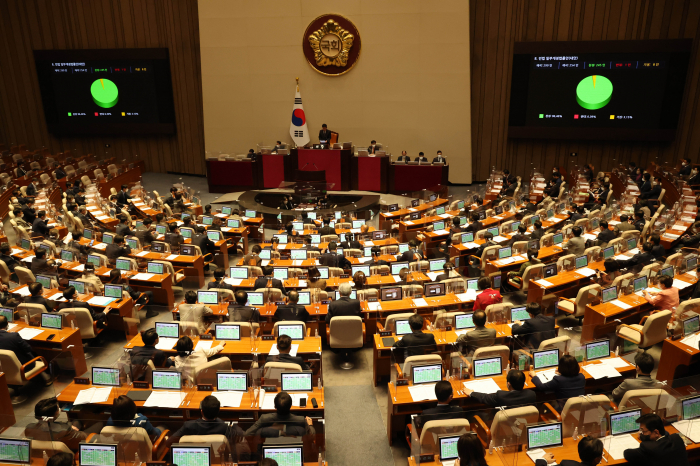Healthcare
South Korea passes new law making everyone a little younger
The move will drop the custom of recognizing Korean ages, which deem people 1 year old on the day they are born
By The Wall Street Journal Dec 12, 2022 (Gmt+09:00)
3
Min read
Most Read
LG Chem to sell water filter business to Glenwood PE for $692 million


KT&G eyes overseas M&A after rejecting activist fund's offer


Kyobo Life poised to buy Japan’s SBI Group-owned savings bank


StockX in merger talks with Naver’s online reseller Kream


Meritz backs half of ex-manager’s $210 mn hedge fund



SEOUL—As the rest of the world ages, South Koreans are getting younger.
South Korea’s parliament passed laws Thursday abolishing the traditional method of determining ages, which will officially make everyone in the country a year or two younger starting in June 2023.
Unlike in most of the world, people in South Korea turn 1 as soon as they are born and gain another year every New Year’s Day. In everyday life, South Koreans typically cite their “Korean age,” which is also reflected on many government documents.
The new laws will switch everyone to the international standard—which starts people at zero on the day they are born—on official documents when the law takes effect. The shift was a campaign promise by South Korean President Yoon Suk-yeol, who said the country’s continued use of Korean ages caused unnecessary social and economic costs.
Since the 1960s, South Korea has used the international standards for calculating ages for medical and legal documents. But the Korean-age system is used to determine who is old enough to drink or smoke or be conscripted into the army. When the law takes effect, the legal drinking age of 20 will change to 19, effectively remaining the same but reflecting the switch to international age standards.
The change will prevent confusion for Koreans, particularly when it comes to providing some medical and administrative services. For example, many South Koreans were confused by Covid-19 rules, as age brackets for vaccinations were based on international ages rather than the Korean ages that people are used to.
“The revision is aimed at reducing unnecessary socio-economic costs as legal and social disputes along with confusion persist due to the different ways of calculating age,” ruling party lawmaker Yoo Sang-bum, who proposed the bill, told parliament on Thursday.
Lee Yoo-jin, who is set to graduate from university next year, is 26 based on her Korean age. She is eager to tell people that she is 24.
South Korean society has designated ages for when a person should graduate from a university, find a job and get married and shifting to the global age standards feels like she has gained time, Ms. Lee said.
“Now if I find a job within the next two years, I’ll be 26 instead of 28,” she said.
Calculating age based on calendar years rather than birth dates is seen as a remnant of ancient culture in East Asian countries like China, Japan and South Korea. A child born on Dec. 31, for example, would be considered a year old and then would turn 2 on New Year’s Day.
China, Japan and North Korea shifted to the global standard decades ago. In China, age is counted from zero for legal and official matters, but in everyday life some people add one year to their actual age, gained on the Lunar New Year. Japan implemented the international age system in 1950 and in recent decades it has become the standard in informal usage as well. North Korea abandoned the Korean-age system in the 1980s.
Despite being used to Korea’s age customs, the majority of South Koreans supported the shift to international standards. More than 80% of South Koreans supported unifying the age-counting system, according to a September poll by the Ministry of Government Legislation. It is difficult to pinpoint the origin of South Korea’s age-counting system, which has persisted due to the country’s “rank-based society,” a spokeswoman for the ministry said.
In South Korea’s hierarchical society, age influences how people interact. For office workers like Cho Min-yeong, the change isn’t necessarily a positive one. He turns 30 according to his Korean age next year, but with the legislative change his legal age will be 28. Age is one of the first things South Koreans ask each other at work and in social situations, and suddenly becoming two years younger will likely cause confusion in the perception of social status, Cho said.
“There are social expectations and milestones based on age and personally the new legal system creates confusion for me,” he said.
Write to Dasl Yoon at dasl.yoon@wsj.com
More to Read
-

-
 EconomySouth Korea to boost aid for chipmakers to $23 billion, expanding extra budget
EconomySouth Korea to boost aid for chipmakers to $23 billion, expanding extra budgetApr 16, 2025 (Gmt+09:00)
-
 AutomobilesSouth Korea announces emergency support for auto sector against US tariffs
AutomobilesSouth Korea announces emergency support for auto sector against US tariffsApr 09, 2025 (Gmt+09:00)
-
 EconomyChina says it is aiming to coordinate tariff response with Japan, South Korea
EconomyChina says it is aiming to coordinate tariff response with Japan, South KoreaApr 02, 2025 (Gmt+09:00)
-

Comment 0
LOG IN


